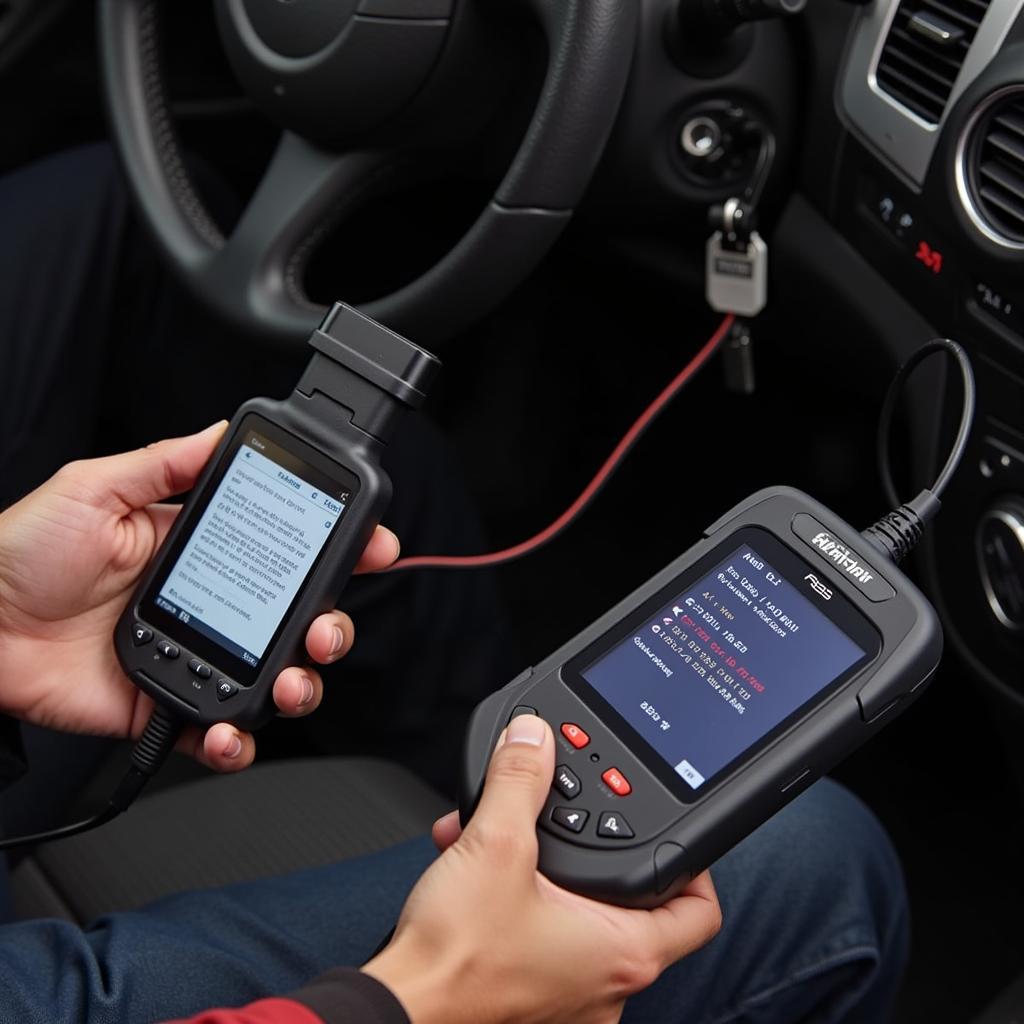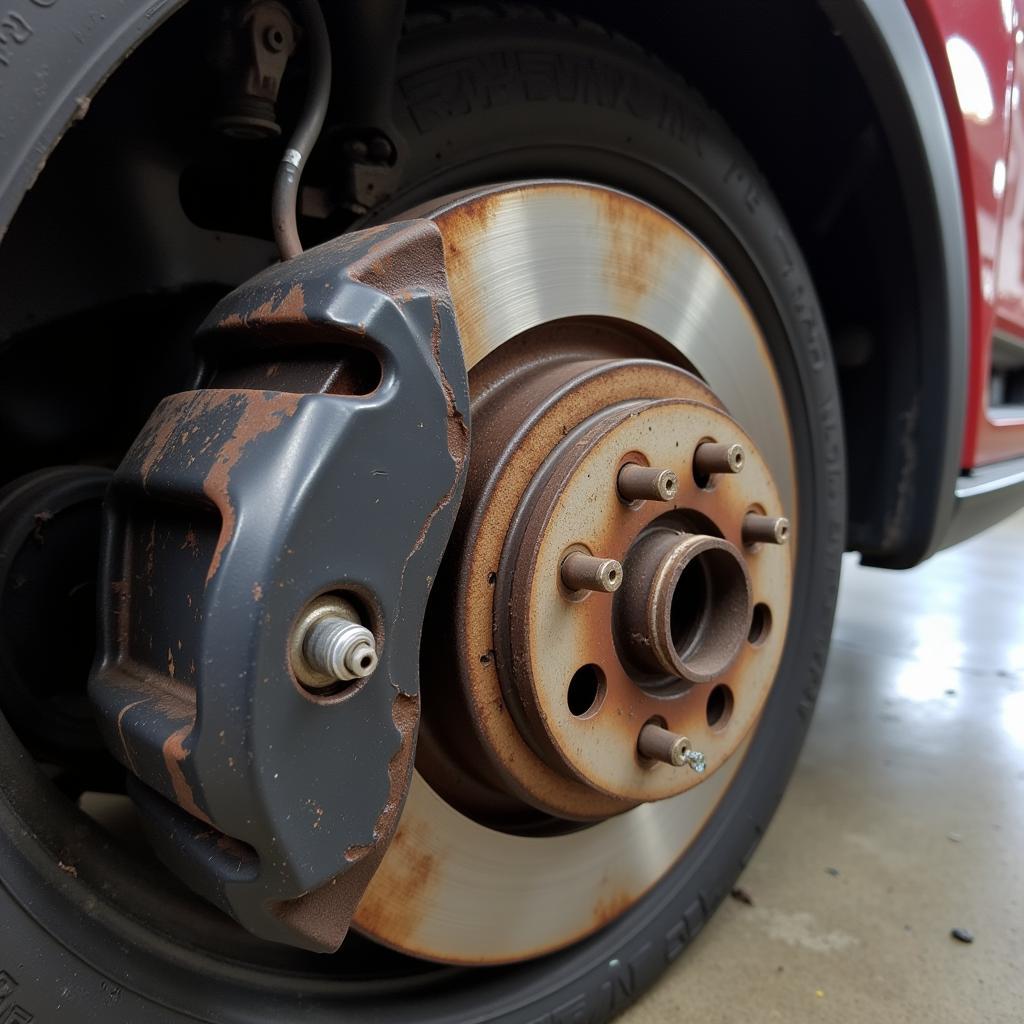That dreaded antilock brake warning light glaring at you from the dashboard can be unsettling. It signals a potential issue with your vehicle’s Anti-lock Braking System (ABS), a crucial safety feature that prevents wheel lockup during hard braking. Understanding what triggers this warning light and how to address the problem is vital for your safety and the longevity of your vehicle. This article will guide you through the common causes, troubleshooting steps, and potential solutions for an antilock brake warning. Read on to regain control and confidence in your braking system.
Antilock brake warning light are a common issue, and understanding their causes is the first step towards a solution.
Understanding Your ABS System
The ABS is a complex system that uses sensors at each wheel to monitor wheel speed. When you brake hard, these sensors detect if a wheel is about to lock up. If so, the ABS module modulates brake pressure to prevent the lockup, allowing you to maintain steering control and avoid skids. A malfunction in any part of this system can trigger the antilock brake warning light.
Common Causes of an Antilock Brake Warning
Several factors can trigger the antilock brake warning light. These include:
- Low Brake Fluid: Perhaps the most common cause is low brake fluid. This can signify a leak in the brake system, requiring immediate attention. Always check your brake fluid level first when you see this warning light.
- Faulty ABS Wheel Speed Sensors: These sensors are exposed to the elements and road debris, making them susceptible to damage. A malfunctioning sensor can send incorrect signals to the ABS module, triggering the warning light.
- Damaged Wiring: Wiring issues, such as corrosion or breaks in the wiring harness, can disrupt communication between the sensors and the ABS module.
- Malfunctioning ABS Module: The ABS module is the brain of the system. While less common, a faulty module can cause various problems, including illuminating the warning light.
- Blown Fuse: A blown fuse in the ABS circuit can disable the entire system. Check your vehicle’s owner’s manual for the location of the ABS fuse.
Common cuase of antilock brake warning light provides more detail on common causes.
Troubleshooting the Antilock Brake Warning Light
What can you do when the antilock brake warning light illuminates? Here’s a step-by-step guide:
- Check Brake Fluid: Inspect the brake fluid reservoir. If it’s low, top it off and check for leaks. If the fluid level drops again quickly, seek professional help.
- Visual Inspection: Examine the wiring and brake lines for visible damage or corrosion.
- Diagnostic Scan: If the visual inspection doesn’t reveal anything obvious, a diagnostic scan is essential. This scan can pinpoint the specific fault codes stored in the ABS module, providing valuable insights into the problem’s source.
Solutions for an Antilock Brake Warning
Once you’ve identified the cause, you can explore the appropriate solutions:
- Brake Fluid Top-up/Repair: If low brake fluid is the culprit, topping it off is a temporary fix. However, identifying and repairing the leak is crucial to avoid further problems.
- Wheel Speed Sensor Replacement: A faulty sensor usually requires replacement. This is a relatively straightforward procedure for a qualified mechanic.
- Wiring Repair/Replacement: Damaged wiring needs to be repaired or replaced. This can be a more complex task, often requiring professional assistance.
- ABS Module Repair/Replacement: A malfunctioning ABS module may be repairable, but in some cases, replacement is necessary. This is a specialized task best left to professionals.
- Fuse Replacement: If a blown fuse is the cause, replacing it is a simple and inexpensive fix.
Antilock warning after brake fluid explores this specific scenario.
Professional Diagnosis and Repair
While some simple fixes, like replacing a fuse, can be done by the average car owner, diagnosing and repairing complex ABS issues requires specialized tools and expertise. Professional mechanics have access to advanced diagnostic equipment and the knowledge to interpret fault codes accurately. They can also perform the necessary repairs safely and efficiently.
 Mechanic Using an ABS Diagnostic Scanner
Mechanic Using an ABS Diagnostic Scanner
“Addressing ABS issues promptly is crucial,” says automotive diagnostics expert John Smith, ASE Certified Master Technician. “Ignoring the warning light can compromise your safety and lead to more extensive and costly repairs down the line.”
Conclusion
The antilock brake warning light is a crucial safety indicator. Understanding its potential causes and taking appropriate action can help you maintain a safe and reliable braking system. While some issues may have simple solutions, seeking professional help is often the best course of action for complex problems. Don’t ignore the antilock brake warning – address it promptly to ensure your safety and the longevity of your vehicle.
S10 antilock warning after brake fluid offers specific advice for S10 owners.
FAQ
- What does the antilock brake warning light mean? It indicates a potential problem with your Anti-lock Braking System (ABS).
- Is it safe to drive with the antilock brake warning light on? While your regular brakes should still function, your ABS is disabled, potentially compromising your safety in emergency braking situations. Avoid hard braking and seek professional diagnosis.
- How much does it cost to fix an antilock brake warning light issue? The cost varies depending on the specific problem. It could range from a few dollars for a fuse replacement to several hundred for more complex repairs.
- Can I fix the antilock brake warning light myself? Simple fixes like replacing a fuse or topping off brake fluid can be done at home. However, more complex issues require professional expertise and specialized tools.
- How do I prevent antilock brake warning light issues? Regular brake system maintenance, including fluid checks and inspections, can help prevent problems.
- What if the ABS light comes on and off intermittently? This could indicate an intermittent problem, which can be difficult to diagnose. A professional diagnostic scan is essential.
- Can a low battery cause the antilock brake warning light? While less common, a severely low battery can sometimes affect the ABS system. Check and address any battery issues first.
97 monte carlo brake warning light and antilock light offers specific advice for this make and model.

